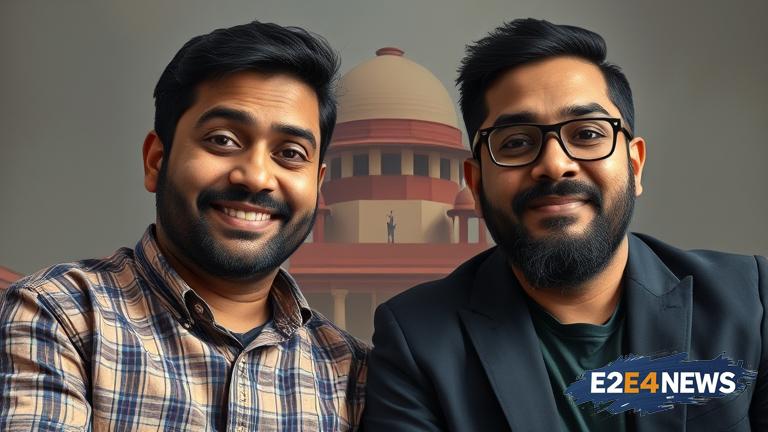In a significant move, the Supreme Court of India has reprimanded comedians Ranveer Allahbadia and Samay Raina for their insensitive jokes about disabled people. The court’s decision has sparked a nationwide debate about the need for sensitivity and respect towards people with disabilities. The comedians, known for their popular podcasts, had made jokes that were deemed offensive and hurtful to the disabled community. The Supreme Court’s intervention has been seen as a welcome step towards promoting inclusivity and dignity for all. The court’s order has also highlighted the importance of responsible speech and the need for public figures to be mindful of their words. Ranveer Allahbadia and Samay Raina have since apologized on social media, acknowledging that their jokes were in poor taste. The apologies have been seen as a positive step, but many have questioned why the comedians did not consider the impact of their words before making the jokes. The incident has also sparked a wider conversation about the representation of disabled people in media and the need for more inclusive and diverse storytelling. Disability rights activists have long argued that the media often perpetuates negative stereotypes and stigma around disability, and that more needs to be done to promote positive and respectful representation. The Supreme Court’s decision has been seen as a significant step towards addressing these concerns and promoting a more inclusive and respectful society. The incident has also highlighted the importance of education and awareness about disability issues, and the need for greater sensitivity and empathy towards people with disabilities. Many have called for greater accountability and responsibility from public figures and media outlets, and for more to be done to promote positive and respectful representation of disabled people. The apologies from Ranveer Allahbadia and Samay Raina have been seen as a positive step, but many have argued that more needs to be done to address the underlying issues and to promote greater inclusivity and respect. The incident has sparked a wider conversation about the need for greater sensitivity and respect towards people with disabilities, and the importance of promoting positive and inclusive representation in media. The Supreme Court’s decision has been seen as a significant step towards promoting inclusivity and dignity for all, and has highlighted the importance of responsible speech and the need for public figures to be mindful of their words. The incident has also sparked a wider conversation about the representation of disabled people in media, and the need for more inclusive and diverse storytelling. Many have argued that the media often perpetuates negative stereotypes and stigma around disability, and that more needs to be done to promote positive and respectful representation. The Supreme Court’s decision has been seen as a significant step towards addressing these concerns and promoting a more inclusive and respectful society. The incident has also highlighted the importance of education and awareness about disability issues, and the need for greater sensitivity and empathy towards people with disabilities. The apologies from Ranveer Allahbadia and Samay Raina have been seen as a positive step, but many have argued that more needs to be done to address the underlying issues and to promote greater inclusivity and respect. The incident has sparked a wider conversation about the need for greater sensitivity and respect towards people with disabilities, and the importance of promoting positive and inclusive representation in media. The Supreme Court’s decision has been seen as a significant step towards promoting inclusivity and dignity for all, and has highlighted the importance of responsible speech and the need for public figures to be mindful of their words.
